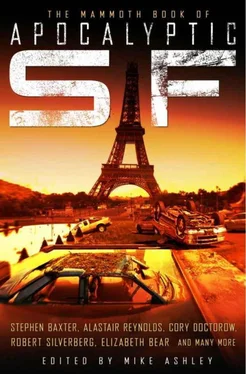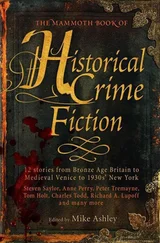“Hardly true.” Gravely, Pepe shook his head. “The mission will take us all.”
The robots dug a new grave in the plot of rocks and dusk outside the crater where our parents and our older siblings had lain so long; beside them the sad little row of smaller mounds that covered my beagles. We buried her there, still rigid in her space gear. Arne spoke briefly, his voice hollow and somber in his helmet.
“I do miss her. It’s a terrible time for me, because I think I killed her. I’ve read the diaries of ourselves in love. I think she loved me again, though she never told me, or said much to anybody. Perhaps I should have guessed, but I’m not my brother.”
“We’ll have another chance.” Tanya tried to comfort him. “But we can’t help what we are.”
We watched the robots fill the grave and delayed the launch again while he made a marker to set at the head of it, a metal plate that should stand forever here on the airless Moon, bearing only this legend:
DIANLAZARD NUMBER THREE
“Three.” His voice in the helmet was a bitter rumble. “Numbers. That’s all we are.”
“More than that,” Tanya protested. “We’re human. More than human, if you remember why we’re here.”
“Not by choice,” he grumbled. “I wish old DeFalco had left my father back on Earth.”
Muttering and swallowing whatever else he wanted to say, he knelt at the foot of the grave. The rest of us waited silently, isolated from one another in our clumsy armor. Shut up in her own tiny world, Dian had seemed content with the precious artefacts she cared for. I felt sad that I had never really got to know her.
Arne rose from his knees and Tanya led us from the cemetery to the loaded plane. Our five individual robots had to be left on the station, but the sixth, the one DeFalco had not lived to program, came with us. We called it Calvin.
From orbit, we studied those dark blots again and found them changed.
“They’ve moved since we were children,” Arne said. “Moved and grown. I don’t like them. I don’t think the planet’s ready for us.”
“Ready or not,” Tanya grinned and leaned cheerfully to slap his back, “here we go.”
“I can’t imagine—” Muttering, he scowled at the ulcered Earth. What could they be?”
“Bare lavas, maybe, where the rains have left no soil where anything could grow?”
“Maybe burns?” She waited for her turn to study the data. “The spectrometers show oxygen levels high. More oxygen could mean hotter forest fires.”
“No smoke.” He shook his head. “Fires don’t burn for years.”
“Let’s go on down.”
She had Pepe drop us into a landing orbit above the equator. Low over Africa, we found the Great Rift grown still wider. That inland sea had risen, flooding the ancient shore, yet she decided to land near it.
“Why?” Arne demanded. “Have you forgotten those monsters on the beach?”
“I want to see if they’ve evolved.”
“I don’t like that.” He nodded at the monitor. “That black area just west of the rift. I’ve watched it creeping across central Africa, erasing what I think was dense rain forest. Something ugly!”
“If it’s a challenge, I want to cope with it now.”
She had Pepe set us down on the bank of a new river, just a few miles from that narrow, cliff-walled sea.
We rolled dice to be first off the plane. Winning with a six, I opened the air lock and stood a long time there, staring west across the grassy valley floor to a wall of dark forest till Tanya nudged me to make room for her.
Pepe stayed on the plane, but the rest of us climbed down. Tanya picked blades from the grass at our feet and found them the same Kentucky Blue she and Pepe had sowed so long ago. When we looked through binoculars, however, the forest was nothing they had planted.
Massive palm-like trees lifted feathery green plumes and enormous trumpet-shaped purple blooms out of a dense tangle of thick crimson vines.
“A jungle of riddles,” Tanya whispered. “The trees could be descended from some cactus species. But the undergrowth?” She stared a long time and whispered again, “A jungle of snakes! Slick red snakes!”
I saw them at last, when she passed the binoculars to me. Heavy red coils, rooted in the ground, they wrapped the black stalks of things that looked like gigantic toadstools. Writhing like actual snakes, they kept striking as if at invisible insects.
“A new evolution!” Tanya took the glasses back. “Maybe from the swimmers we saw on that beach? Maybe red from mutant photosynthetic symbiotes? I want a closer look.”
“Don’t forget,” Arne muttered. “Closer looks have killed you.”
We saw nothing else moving till Pepe’s radio voice came from the cockpit, high above us. “Look north! Along the edge of the jungle. Things hopping like kangaroos. Or maybe grasshoppers.”
We found a creature venturing warily over a ridge, standing tall to look at us, sinking out of sight, hopping on toward us to stand and stare again, rumbling with something like the purr of a gigantic cat. A biped, it had a thick tail that balanced its forequarters and made a third leg when it stood. Others came slowly on behind it, jumping high but pausing as if to graze.
“Our retrojets must have scared everything away,” Pepe called again. “But now! Farther up the slope. A couple of monsters that would dwarf the old elephants. Half a dozen smaller, maybe younger.”
“A danger to us?” Arne called uneasily.
“Who knows? The big ones have stopped to look. And listen, too. They’ve spread ears as wide as they are. They do look able to smash us if they like.”
“Shouldn’t we take off?”
“Not yet.”
Arne had reached for the binoculars, but Tanya kept them, sweeping the forest edge and the riverbank and the herd of hopping grazers.
“A wonderland!” She was elated. “And a puzzle box. We must have slept longer than I thought, for all this evolutionary change.”
Arne climbed back into the plane and came down with a heavy rifle he mounted on a tripod. He squinted through the telescopic sight, waiting for the monsters.
“Don’t shoot,” Tanya said, “unless I tell you to.”
“Okay, if you tell me in time.”
He held the rifle on them till they stopped a few hundred yards from us. Armored with slick purple-black plates that shimmered under the tropic sun, they looked a little like elephants, more like military tanks. The tallest came ahead, spread its wing-like ears again, opened enormous bright-fanged jaws, bellowed like a foghorn.
Arne crouched behind his gun.
“Don’t,” Tanya warned him. “You couldn’t stop them.”
“I’ve got to try. No time to take off.”
He kept the gun level. We watched those great jaws yawning wider. A thunderous bellow scattered the hoppers. She caught his shoulder and pulled him away from his weapon. The monster stood there a long time, watching us through huge, black-slitted eyes as if waiting for an answer to its challenge, till finally it turned to lead its family on around us and down to the river. They splashed in and disappeared.
“Nothing I expected.” Tanya stood frowning after them. “No large land animal could have survived. Perhaps a few sea creatures did. The whales were prehistoric land dwellers that migrated into the sea. Maybe they’ve returned as amphibians.”
The alarmed hoppers settled down. Tanya had us stand still in the shadow of the plane as they grazed in toward us, till Pepe shouted again.
“If you want a killer, here it comes!”
The hopper leader stood tall again, with a kind of purring scream. The grazers reared and scattered in panic.
Something swift and tiger-striped pounced out of the grass and darted to overtake a baby before it could leap again. Arne’s rifle crashed, and the two tumbled down together.
Читать дальше












